Can an RV be Green or Eco Friendly?

When I mention the words eco-friendly, green and RV in the same sentence, nearly every time it’s met with a roll of the eyes and a scoff. I can’t say I blame them, before being an RV’er I thought the same way. “RV’s can’t be green…..right?!?”
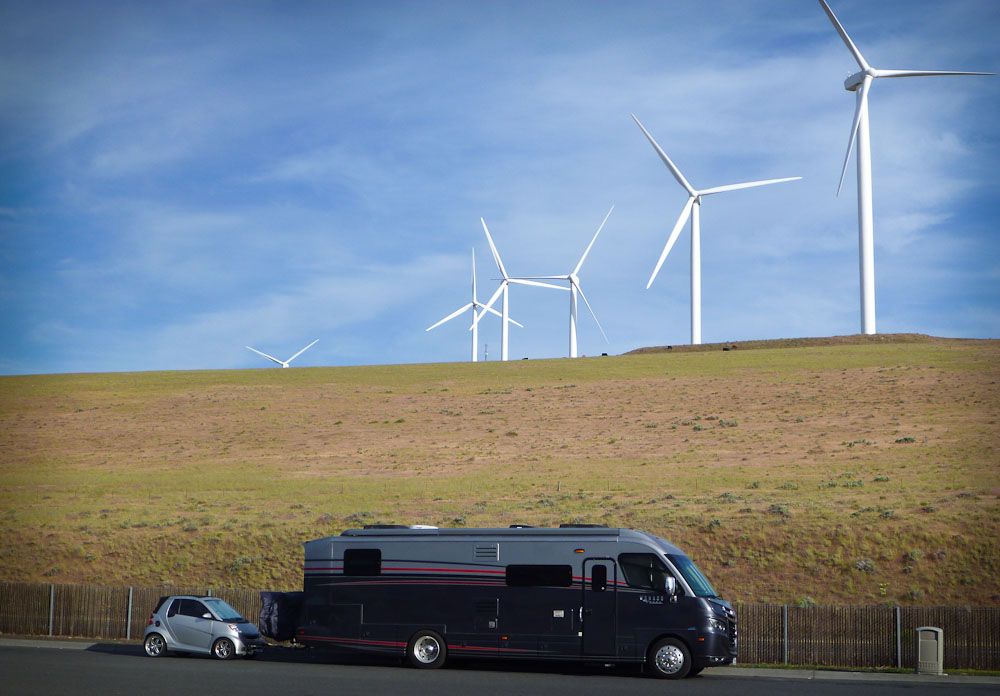
RV’s are eco-friendly! Of course I don’t have any hard research over a 10 year period to back this up, but here is what I do know:
Our RV is around 200 square feet. That is way smaller than any house or apartment we have ever lived in. So, we only heat, cool, clean and maintain around 200 sq ft. Our water consumption has gone down by huge margins and we only log around 15,000 – 20,00 miles a year total between our smart car and our RV. So, just by living in the RV, we cut our personal carbon foot print by more than half.
Now, that being said there are several, quick easy mods you can make to your RV to go even a little greener and live off the cord longer! Below are some of the ways we’ve found to travel a little lighter on the environment and live a little greener while on the road full-time.
Tips for Green RV Travel
• Living off the cord – National Forest Lands and Bureau of Land Management both offer lots of free (we all like free) dry camping. The primitive camp areas are typically surrounded by nature and some locations are right outside of the most popular state and national parks. There are no hookups, but the beautiful surroundings and free camping are totally worth it! (Don’t forget to check out the “off the cord” communities like Quartzite, Slab City and the amazing Burning Man). When you stay off the cord challenge yourself to live as long as possible without using the generator, or filling your tanks.
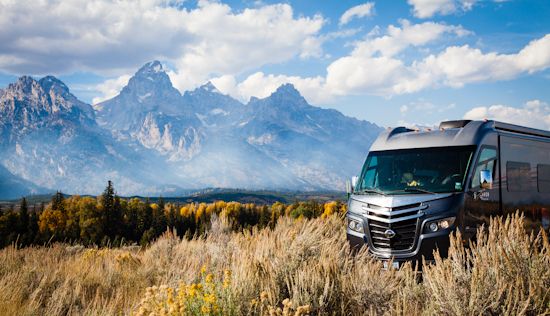
• Water Filtration System – Invest in a good water filtration system. Not only will this save you money on bottled water but it will result in a lot less plastic waste. Remember when you leave your RV fill up a reusable water bottle to take along with you.
• LED Lights – Switching out your traditional bulbs for LED’s will not only save electricity, but they use so little that you can dry camp for much longer without running down your house batteries! Our Vesta came with halogen bulbs which pulled 26 amps, when we replaced all the lights with LED’s we’re now pulling 3 amps! That is HUGE power difference, and the LED’s are much cooler to the touch keeping our coach cooler in the warmer months.
• Low Flow Faucets – Change out your kitchen and bathroom aerators. Check your hardware stores for 1.2-1.5 (gallons per minute) aerators. Switch out your shower head for an eco option, look for anything under 2.5 gpm. This will conserve water, keep great water pressure and enable you to camp longer before needing to dump your grey water. Just because you’re connected to water at a campground challenge yourself by using as little water as you can. Every little bit saved truly helps the environment.
• Solar Panels – A small portable panel will power most of your electronics or to stay off the cord even longer, go for an extreme Solar Set up like ours. Having solar power also allows you to live “off the cord” much longer, this saves they environment and you money!
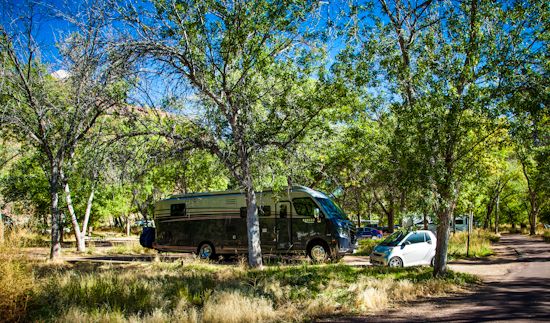
It was dry camping all the way at Zion National Park but thanks to our solar panels we had hot meals, coffee, cool fans and didn’t turn on the generator once in 4 days.
• Bio Diesel – Switching back and forth from diesel to bio-diesel blends like B-20 is no problem. So, when you come across a bio-blend supply, fill er’ up! (Consult your engine mfr. to make sure). If your engine is out of warranty you might even consider converting your engine to use 100% biodiesel. Many people power their cars, trucks, and RV’s with veggie oil.
• Ditch Disposables – Many RV’ers use disposables because they make cleaning up easier, but it’s harder on the environment. We travel with reusable plastic cups and plates…and of course a couple fancy coffee and wine glasses (we’ve gotta have a little class right?).
• Grey/Black Tank Cleaners – Chemical based cleaners and deodorizers contain harmful chemicals like formaldehyde. These chemicals have been shown to cause different kinds of cancers as well as pollute the soil and water. Why risk it, buy the enzyme based tank cleaners instead. If you’re at a campground you can dump your tanks every 2 – 3 days save your tank cleaners, no reason to use them if you can dump at your leisure. Or, skip the black tank all together and consider a composting toilet!
• Recycle – Keep an extra trash can or box in a storage compartment to hold your recyclables. If your campground doesn’t offer recycling, check out apps like “irecycle”. Many grocery stores offer recycling, so when you go into town take them with you and do your part to keep trash out of the landfills.
• Tow Car – Select a more eco-friendly tow car. Auto manufacturers have launched a host of new fuel efficient cars perfect for flat towing behind an RV. From 2-doors, to 4-doors, to convertibles, pretty much any style of new car can be found with great fuel economy and more earth friendly materials. We chose the Smart because of it’s 40 MPG, and the fact it’s 95% recyclable once it’s dead.
• Camp Fires – This is a tricky one: everyone loves a campfire right? Remember these fires release toxins into the environment. If you can save campfires for necessities like keeping warm, or cooking, this will help keep the air a little cleaner. As always DO not throw trash in the fire, plastics, metals, or anything else as this releases unnecessary toxins into the air.
• Buy Local – One of our favorite things about travel is sampling all of the local fare. Being green has never tasted sooo good; from farmers markets to local micro brews to local coffee roasters. So much yummy local food and drink to explore across the USA!
Want to see if we’re staying true to our Eco Friendly claims? Well, call me crazy or genius, but either way I’ve painstakingly kept track of our energy usage and water consumption at several parks during 2012!
Energy and Water Consumption of our Vesta
It really erk’s me when people look at an RV and assume we must be the worst people in the world on the environment. Those who are self-proclaimed ‘Green’ can sometimes be the most judgmental. I don’t blame them; it’s just a lack of knowledge and understanding of the RV lifestyle.
This post is simply about the amount of Energy and Water we consume while staying at a campground. It’s a lot of numbers to look at, and a rather dry read, but if you’re interested in energy conservation this is right up your alley.
Our yearly electricity consumption in the RV is 57.3% less than the average U.S. household.
Our yearly water consumption in the RV is 92.8% less than the average U.S. household.
Our Estimated RV Electricity Use: 4,913 kwh
Our Estimated RV Water Use: 9,053 gallons
Average Household Electricity Use: 11,496 kwh
Average Per Person Water Use: 31,025 gallons
Average Household Water Use: 127,400 gallons
(**all numbers above based on Yearly consumption)
The Sum Up: As you can see from our estimated yearly consumption living in an RV is way more earth friendly than living in the average American home. If you step back and think about it, this all makes sense: RV’ers don’t have yards, they live in 200-400 square feet, they follow the good weather, and most don’t drive very far (and if they do a long drive they stick around to enjoy the destination). To further turn the screw on the “RV’s aren’t Green” comment, this doesn’t even take into consideration other major carbon offenders such as lawn tools, airplane travel, hotel stays, etc. No matter how you slice it, living in an RV can be a great opportunity to challenge yourself to live life a little greener.
Think this is awesome, or a load of crap? Tell me about it in the comments below. If you have any insight or personal experience let us know about it.
The Nitty-Gritty: Below are the continued updates throughout our travels where I document our energy consumption. I will continue to keep track of our usage every time we stay at a campground that has an electric meter attached to the shore power. I’ve also listed the sources where I found data to base these claims if you want to do a little research yourself.
Update 07/2012: In Bar Harbor Maine we connected to shore power with a meter. Our first few days were spent right on the water with beautiful views but the sun beat down on our windshield in the AM and on the driver’s side most of the day. So, of course, I see an opportunity to do a test. We’ll stay in this site for a few days then move to a shadier site and see what happens. FYI – Daylight hours are extra long during the summer in the north, and the temperature is 80-90 degrees during the day, and 50-60 degrees at night. So we ran the electric heater a few nights, and the A/C a few hours per day (more in the sunny spot of course).
Sunny Site: 80% Sun 20% Shade
Arrival Meter Read: 8427 kwh date: 06/27/2012 @ 8:00am
Departure Read: 8498 kwh date: 07/02/2012 @ 9:00am
Total Energy Consumed: 71 kwh over 121 hours (5 days & 5 nights)
Water Consumption: 75 gallons
Yearly Estimated Average: 5183 kwh
Shady Site: 30% Sun 70% Shade
Arrival Meter Read: 3056 kwh date: 07/02/2012 @ 9:45am
Departure Read: 3113 kwh date: 07/12/2012 @ 11:15am
Laundry: 3 loads 9 kwh (wash: 1kwh+20 gal; dry: 2kwh)
Total Energy Consumed: 66 kwh over 241.5 hours (10 days & 10 nights)
Water Consumption: 185 gallons
Yearly Estimated Average: 2409 kwh
How we lived: See below, we pretty much lived the same as the last update. Working on the computers, cooking in, running the A/C, etc.
Conclusion: Whoa these numbers are CRAZY! By staying in a shady site we used 50% less electricity. So if you want to live a little “greener” in your RV select a spot surrounded by woods instead of in the open (during the Summer). Looks like our numbers are way lower than the typical household average for water and electricity.
***************************************************************************
Update 05/2012: At Spring Gulch RV resort in Pennsylvania we found another meter atop our shore power so we’ve continued the RV energy consumption test.
Arrival Meter Read: 8303 kwh date: 05/22/2012 @ 10pm
Departure Read: 8323 kwh date: 05/25/2012 @ 10am
Laundry: 1 load 3 kwh (wash: 1kwh+20 gal; dry: 2kwh)
Water Heater 9 kwh
Total Energy Consumed: 32 kwh over 60 hours (2 days & 3 nights)
Water Consumption: 83 gallons
How we lived: During these few days we were working constantly, running laptops, charging batteries, cooking 3 times per day (mostly electric), basically in the RV most hours of the day. Our electric water heater is currently broken so we warmed the water with propane (I’m estimating 3 kwh per day saved). The a/c ran for approximately 6 hours of our stay and we ran the fans non-stop when the a/c wasn’t on. We used 1 load worth of laundry. Temperatures were warm and humid.
I only had to dump the grey water upon departure so a maximum of 50 gallons used for showers, dishes, washing hands, etc. Toilet likely used 8 gallons of water. Cooking/Drinking used 5 gallons.
Conclusion: Looks like our first test in Yellowstone NP was fairly accurate with the water consumption, but way off on the electricity. According to our new numbers our yearly water consumption is estimated 12,118 gallons and our yearly electricity consumption is estimated at 4,672 kwh. Of course in PA the temperatures have been mild compared to the highs and lows of our Yellowstone week. We’ll keep track next time we find a meter attached to our shore power, and update our averages.
***************************************************************************
Original Post 09/2011
In Yellowstone National Park we connected to shore power that had a meter attached to it. When I plugged my 50A cord into the box I thought to myself: How Much electricity does my “self proclaimed Green RV” consume? I marked my current meter reading at 22325, and decided to do a little test. Turn off the Propane, Go all electric in the RV and try not to be conservative to see how much energy we consume in our RV.
So here is the skinny on our electric consumption in the RV for 8 days and 7 nights:
Arrival Meter Read: 22325 kwh
Departure Meter Read: 22510 kwh
Total Energy Consumed: 185 kwh
Projected Yearly RV Energy Consumption based on test: 9,620 kwh
Average Yearly U.S. Household Energy Consumption: 11,496 kwh
We also consumed approximately 220 gallons of water during our stay.
Projected Yearly Consumption based on test: 11,440 gallons
Average Yearly U.S. Household Water Consumption (including outdoors): 127,400 gallons
How we lived: We made sure not to conserve while staying at Yellowstone, a little bit different than our normal routine. We spent approx. 7 hours per day in the park away from the RV, and 17 hours inside the RV working, cooking, hanging, and sleeping.
It’s the end of September and the weather is pretty average: upper 70’s as the high, and mid 30’s as the low. No rain, no snow, just partly cloudy days with 11 hours of daylight. We are parked in a campsite with trees nearby; our average sun exposure to the RV is on average 6 hours per day.
Here is a list of our average everyday electrical use during the stay:
Electric Griddle (2x per day)
Convection Oven (1 hour per day)
Water Heater (on all day – like a home)
Fridge (on all day)
Electric HVAC Heater (3 hours per day)
1500 watt Space Heater (10 hours per night)
200 watt Mini Space Heater in Bay (10 hours per night)
Mattress Heating Pad (8 hours per night)
Desktop Computer (4 hrs. per day)
Laptop Computers x2 (4 hrs. per day)
TV (1 hr. per day)
Home Theater System (2 hrs. per day)
5 Minute HOT Showers (2x per day)
Electric Kettle/Water Boiler (1x per day)
Espresso Machine (1x per day)
Interior Lights (6 hours per day)
Water Tank Heating Pads (10 hours per night)
Diesel Engine Core Heater (plugged in all day/night)
Misc. Chargers: cell phones (x2), Nook, Camera Batteries, AA rechargeable, vacuum, etc.
****************************************************************************
I’m not Perfect Disclaimer:
I am not a research scientist, and none of this is exact. I wanted to see a general idea of how much energy Nikki and I consume over the process of a year. This test is not perfect, nor scientific, and I’m sure it has several holes, but it works for us and it’s interesting nonetheless.
I came up with the average household energy consumption by polling several of my friends and family to see what their energy consumption is per month during the Fall and Spring (for average weather temperatures). I have also spent multiple hours searching the internet for more official information. Here are a few of the websites I used for reference on average energy and water consumption for US Homes:
(all links live and working as of 8/2012)
http://www.physics.uci.edu/~silverma/actions/HouseholdEnergy.html
http://hypertextbook.com/facts/2003/BoiLu.shtml
http://hypertextbook.com/facts/2003/BoiLu.shtml
http://apps1.eere.energy.gov/states/residential.cfm/state=TX
http://www.epa.gov/WaterSense/pubs/indoor.html
http://www.mde.state.md.us/assets/document/resaudit.pdf
http://www.energystar.gov/index.cfm?fuseaction=find_a_product.showProductGroup&pgw_code=CW
http://www.mla-online.com/workback.htm
http://205.254.135.24/tools/faqs/faq.cfm?id=97&t=3
http://en.wikipedia.org/wiki/Energy_in_the_United_States#Consumption
http://www.drinktap.org/consumerdnn/Home/WaterInformation/Conservation/WaterUseStatistics/tabid/85/Default.aspx
http://des.nh.gov/organization/commissioner/pip/factsheets/dwgb/documents/dwgb-26-2.pdf
http://www.gorving.com/explore-rvs/all-about-rving/where-were-going
RV Energy and Water Consumption Updates 2013
If you want to know the details make sure you read the toggle above marked “Energy and Water Consumption of our Vesta”. These are basic notes for our records, and for any other sick minded person like myself (this is Jason by the way) who wants to challenge themselves to be more green, less wasteful, and live a little cleaner environmentally friendly lifestyle. This is not pretty, its just the numbers:**********************
For the Records:
40 Gallons: Black Tank Dump – dumped before 2/3 full and washed out with spray hose
50 Gallons: Grey Tank Dump – Dumped at full
20 Gallons + 3kwh: Laundry wash and dry
10 Gallons: Weekly Consumption – cooking, coffee, drinking
Unknown: I’m not factoring in what we use while eating out, or visiting others. Since the RV is our base camp for adventure, work, sleeping, eating, and so on, we spend 75% of our time in and around the RV so we’ll consider this X factor a wash if that’s ok with you.
***********************Mesa, AZ at Monte Vista RV Resort
4.2 days: 02/06/2013 1:00pm – 02/10/2013 4:30pm
Total Energy Consumed: 53 kwh
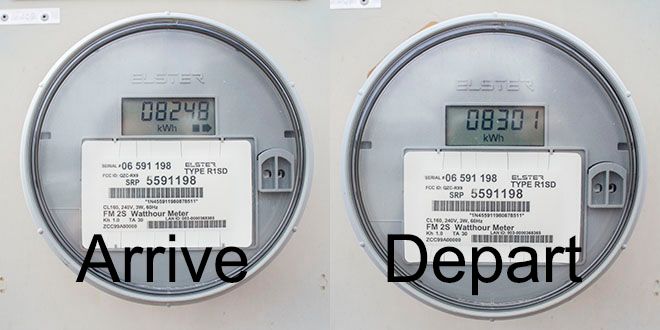
This is the first resort we’ve noticed a water meter, so we hooked up the freshwater hose and the sewer hose and let it flow like a normal home (much easier than trying to fill up the grey tank and dump it every time to keep track of water usage.
Total Water Consumed: 30 Gallons ***I can’t believe this meter is correct. We took showers, cooked, etc. I would expect the number to be closer to 60 gallons or so. I’ll try again next resort that has a water meter.
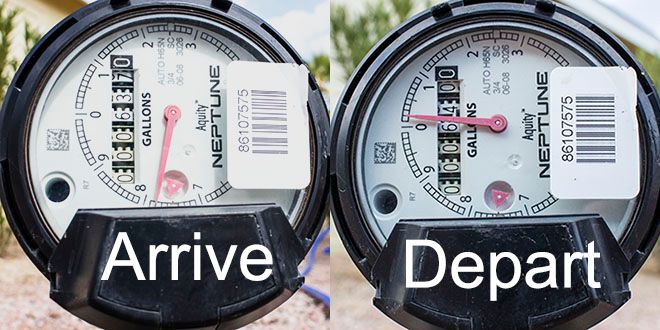
Living Notes: Mild climate for winter however the temps dropped down to nearly freezing most nights so we did run the space heater inside the RV. We spent most of our time here working so we were pretty much inside the RV 80% of the time and Nikki prepared most every meal inside the RV using electricity. No propane used during this trip, and we didn’t stay long enough to do laundry. Upon departure I did a thorough cleaning of the black tank so our numbers would have been even lower had I not done this.
*********************************************************************
Lake Havasu City, AZ at Campbell Cove RV Resort
61 days: 11/04/2012 – 01/04/2013
4.5 Black Tank Dumps (180 Gallons)
16.5 Grey Tank Dumps (825 Gallons)
1 Hot Water Tank Calcium Cleanout (20 Gallons)
18 Loads of Laundry (360 Gallons)
23524 Arrival Meter Read
24580 Departure Meter Read
Total Energy Consumed: 1056 kwh
4 – 2.5 Gallon Bottle Waters (typically we shy away from bottled water but sometimes the water was un-drinkable even when filtered).
Living Notes: Several cold nights near freezing so we ran the space heater often. Multiple days of heat warm enough we were forced to run the A/C (our windshield faced the Sun from morning till night, not a good spot during the summer months for sure). I ran the electric water heater in the AM and turned it off after our showers (most days). Very little propane use: I ran the furnace for less than 10 hours total and used propane water heater plus electric twice for instant hot water. All cooking done electrically with the induction plate, water boiler, and griddle. We are conservative by nature at this point, but not trying to be ultra conservative for this post.
Conclusion: Overall mild Temperatures, and the enhancements we’ve purchased for saving water and cooking with efficient tools we’re becoming even more green than previous years. Our current readings are a fraction of the typical household.
Did we miss anything? Do you have any eco tips to share? If so, post them in the comment box below we’d love to implement them on our RV so we can be even greener on the road!




